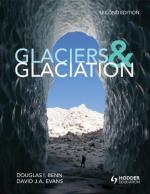|
This section contains 588 words (approx. 2 pages at 300 words per page) |

|
Glaciation is an extended period of time during which glaciers are present and active. It also refers to all the processes that form glaciers and that are at work within a glacier. A glacier is a land-based mass of highly compacted ice that moves downward and outward under its own weight due to gravity. Glaciers may be large enough to cover a continent or small enough to fill a mountain valley and periods of glaciation can last hundreds, thousands, or millions of years.
A glacier is formed by a series of processes that begins with accumulation. Accumulation occurs when the buildup of snow and ice through snowfall, avalanching, or wind transport during cold months greatly exceeds the loss through melting or sublimation (the direct conversion of a solid to a gas) in warmer months. As snow accumulates and deepens, its weight causes increased pressure that converts snowflakes first...
|
This section contains 588 words (approx. 2 pages at 300 words per page) |

|


